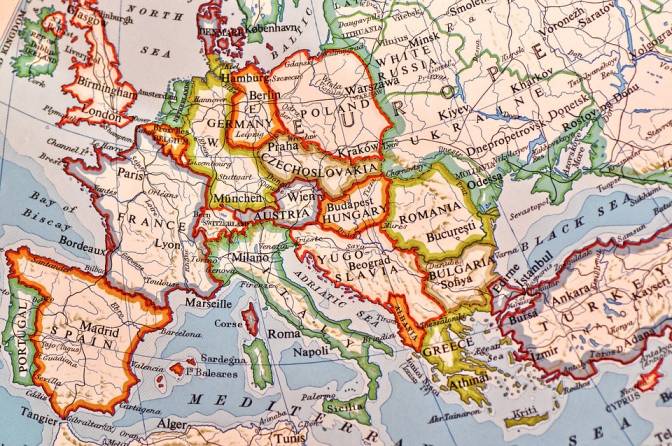
This form of citizenship offers a simple path to getting a passport for those born in qualifying jus soli countries. The process may come with a few adjustments as some countries offer restricted and unrestricted citizenship by birth.
This guide will cover everything you need to know about birthright citizenship, the countries that offer it, and the rules for acquiring citizenship.
The guide will also examine the requirements to acquire a second passport through birthright citizenship and the differences between citizenship by jus soli (right of soil) and citizenship by jus sanguinis (right of blood).
What is birthright citizenship?
Birthright citizenship, also known as jus soli, is the legal principle that grants citizenship to individuals born within a country’s territory, regardless of their parent’s nationality.
Jus Soli vs Jus Sanguinis
Jus soli defines nationality or the right to acquire citizenship through being born within a country or territory, while jus sanguinis determines citizenship by descent. Citizenship is granted if one or both of the person’s parents are citizens of that country, even if the person is born outside its borders. It can also include legal parents by law, such as adoptive parents.
In jus soli countries, citizenship is typically granted automatically to individuals born on their soil, regardless of their parent’s citizenship. However, some countries may impose additional requirements or limitations.
Besides citizenship of a country, a person can also automatically acquire citizenship from national identities of ethnic, cultural, or other origins, such as an Aboriginal tribe or Native Americans.
Determining Birthright Citizenship
Jus soli
Governments determine Jus soli in two ways:
Unrestricted birthright citizenship: Children born in the country’s territory are automatically citizens.
Restricted birthright citizenship: In addition to being born in the country’s territory, the person must also meet conditions such as:
- At least one parent must have been born in the country
- Must have two citizen parents
- At least one parent must have been physically present in the country for a year before birth.
- The father must have been born in the country
- Must have a citizen mother
Jus sanguinis
Jus sanguinis can apply to a person born on foreign soil. It can be as simple as one parent born in the country’s territory, but like jus soli, most countries granting citizenship at birth have different requirements, which could be:
- Both parents were born in the country
- One parent was born in the country and has a current residence permit
- A member of the paternal side must be or have been a citizen
- Parents in a legal marriage and physically present in the country for a specific number of years
Other determinations
In almost all cases, persons born abroad to foreign diplomats or other government employees on active duty will acquire their parent’s citizenship.
Rare cases also exist where a Supreme Court decision grants birthright citizenship on clear and convincing evidence of extenuating circumstances. This can be a stateless child due to unknown or stateless parents or a child born abroad who has a legal parent through adoption.
For the most part, most countries will offer birthright citizenship to children who are born stateless. So for simplicity’s sake, we’ll focus on the most common forms of birthright citizenship.
14 European Countries with Birthright Citizenship

While some European countries offer citizenship to children born on their territory, it often depends on the parents’ citizenship status.
Citizenship is often automatically granted if at least one parent is already a citizen or permanent resident. However, the specific requirements vary by country, and some may involve additional steps or conditions for acquiring citizenship.
For instance, European countries enforce restricted citizenship by birth rule based on jus soli (right of soil) and jus sanguinis (right of blood). So, to know which country in Europe gives citizenship at birth for specific criteria, one would need to refer to the country’s nationality act.
Here is a list of the birthright citizenship countries in Europe and the requirements to obtain it:
 Belgium
Belgium
You can obtain birthright citizenship in Belgium if:
- At least one parent was born in Belgium
- At least one parent had lived in Belgium for ten years
- At 18 years old, with no other citizenship since birth
- At least one parent was born in Belgium and had lived there for five years before birth
 Cyprus
Cyprus
You can obtain birthright citizenship in Cyprus if:
- At least one parent was born in Cyprus or is a Cypriot citizen
 France
France
You can obtain birthright citizenship in France if:
- Born in France, and one or both parents were born in French territory
- 18 years old, and was born in France before 1 January 1994
- Born in France to parents born before independence in a former French sovereign colony/territory
- Born in France on or after 1 January 1994
- 18 years old and was physically present in France for a continuous period of at least five years since age 11
- Between 16 and 18 years old, was physically present in France for a continuous period of at least five years since age 11
- Between 13 and 16 years old and has been physically present in France since eight years old
 Germany
Germany
You can obtain birthright citizenship in Germany if:
- Born in Germany and at least one married parent is a German national
- One parent was a German citizen at the time of birth
- Born after 1 January 2000, and one or both parents were physically present in Germany for at least eight years with indefinite leave to remain
 Greece
Greece
You can obtain birthright citizenship in Greece if:
- One parent is a Greek citizen
- Born in Greece, and at least one parent has been a valid resident in Greece for five years since birth
- Both parents have been legal residents in Greece for five years, and the child completed elementary education (six years)
 Finland
Finland
You can obtain birthright citizenship in Finland if:
- The mother is a Finnish citizen and was at birth.
- The father is a Finnish citizen and is married to the mother
 Ireland
Ireland
You can obtain birthright citizenship in Ireland if:
- Born in Ireland before 1 January 2005
- Born in Ireland, and the mother or father is an Irish citizen, a British national, a resident with indefinite leave to remain, or a resident who has been physically present in Ireland for at least three of the preceding four years
- One parent is an Irish citizen and was born in Ireland
 Italy
Italy
You can obtain birthright citizenship in Italy if:
- 18 years old and has been permanently domiciled in Italy since birth
- 21 or older and was permanently domiciled in Italy for at least three years since 18 years old
- A paternal descendant was an Italian citizen
- Born after 1 January 1948 and a maternal descendant was an Italian citizen
 Luxembourg
Luxembourg
You can obtain birthright citizenship in Luxembourg if:
- One parent was born in Luxembourg
- One parent is a Luxembourg citizen
- 18 years old, and both parents were physically present in Luxembourg in the 12 months preceding birth
- 18 years old and has lived continuously in Luxembourg for the five years preceding their 18th birthday
 Portugal
Portugal
You can obtain birthright citizenship in Portugal if:
- One of the parents is a Portuguese citizen
- One parent resided in Portugal as a lawful resident for at least one year before birth
 Spain
Spain
You can obtain birthright citizenship in Spain if:
- One parent is a Spanish citizen
 Sweden
Sweden
Birthright citizenship can be obtained in Sweden if:
- Born after 1 April 2015, and at least one parent is a Swedish citizen
- Born before 1 April 2015, the child’s father was a Swedish citizen and was married to the mother
- Born in Sweden before 1 April 2015, and the father was a Swedish citizen
- Born after 1 July 1979 and before 1 April 2015, the child’s mother was a Swedish citizen
 Malta
Malta
Birthright citizenship can be obtained in Malta if:
- One parent was born in Malta or is a Maltese citizen
- Born in Malta after 25 September 1964 and before 1 August 2000
 United Kingdom
United Kingdom
Birthright citizenship can be obtained in Malta if:
- Born after 31 December 1982 and before 1 July 2006, and the mother was a British citizen or legal resident
- Born after 31 December 1982 and before 1 July 2006, the father was a British citizen or lawful resident and was married to the mother.
- Ten years old and has not spent more than 90 days outside the country since birth
- Born after 1 July 2006, the mother was a British national or legal resident.
8 Other Countries with Birthright Citizenship
Countries handle birthright citizenship in many different ways. While the United States ensures citizenship at birth through the 14th Amendment, other countries have changed their rules. Some now require at least one parent to be a citizen or legal resident for the child to receive citizenship. In cases where the immigration status of parents is unknown, some nations may impose additional restrictions on birthright citizenship.
Others still offer unrestricted birthright citizenship to anyone born on their soil, regardless of their parent’s nationality. Some countries have added new requirements, such as needing at least one parent to be a citizen or legal resident. These differences reflect how countries balance being open with managing citizenship at birth and regulating the impact of unknown parents or immigration concerns.
Here are other birthright citizenship countries and the rules for obtaining it:
Canada
You can obtain birthright citizenship in Canada if:
- Born in Canada, regardless of the parents’ nationality or legal status.
- Born in Canada to foreign diplomats or individuals with diplomatic immunity does not grant Canadian citizenship at birth.
United States
You can obtain birthright citizenship in the United States if:
- Born in the US, regardless of the parents’ nationality, except for children of foreign diplomats or individuals with diplomatic immunity.
- The 14th Amendment to the US Constitution guarantees citizenship to anyone born on US soil, except for children of foreign diplomats or occupying military forces.
Brazil
You can obtain birthright citizenship in Brazil if:
- Born in Brazil, regardless of the parents’ nationality or legal status.
- Born in Brazil to foreign parents or individuals with diplomatic immunity does not grant Brazilian citizenship at birth.
Antigua and Barbuda
You can obtain birthright citizenship in Antigua and Barbuda if:
- Born in Antigua and Barbuda, at least one parent is a citizen or legal resident of Antigua and Barbuda.
- Since 1981, children born in Antigua and Barbuda to foreign parents who are not citizens or legal residents do not automatically receive citizenship.
Australia
You can obtain birthright citizenship in Australia if:
- Born in Australia, at least one parent is an Australian citizen or a permanent resident.
- Since 1986, children born in Australia to foreign nationals do not automatically receive citizenship unless one parent is a citizen or permanent resident.
- Born in Australia to foreign diplomats or individuals with diplomatic immunity does not grant Australian citizenship at birth.
New Zealand
You can obtain birthright citizenship in New Zealand if:
- Born in New Zealand, at least one parent is a New Zealand citizen or a permanent resident.
- Since 2006, children born in New Zealand to foreign parents do not automatically receive citizenship unless at least one parent is a citizen or permanent resident.
- The rules have been in effect since 1986 when unrestricted jus soli was replaced by the requirement that at least one parent be a citizen or permanent resident.
India
You can obtain birthright citizenship in India if:
- Born in India, and at least one parent is an Indian citizen.
- Since 2004, children born in India to foreign nationals do not automatically receive citizenship unless at least one parent is an Indian citizen.
Pakistan
- Born in Pakistan unless the parents are foreign diplomats or illegal immigrants.
- Since 1951, the Pakistan Citizenship Act has granted citizenship to anyone born in Pakistan except for children of foreign diplomats or illegal immigrants.
Birthright Citizenship for Children
Unrestricted birthright citizenship (jus soli)
The following countries have no restrictions on birthright citizenship, except for children born to diplomats.
A notable difference is Costa Rica, where it doesn’t apply to a baby born of a government employee. It also requires registration with the Costa Rican government before the age of 25.
Country | Status | Conditions |
Antigua and Barbuda | Unrestricted (jus soli) | Except for children born to diplomats. |
Argentina | Unrestricted (jus soli) | Except for children born to diplomats. |
Barbados | Unrestricted (jus soli) | Except for children born to diplomats. |
Belize | Unrestricted (jus soli) | Except for children born to diplomats. |
Canada | Unrestricted (jus soli) | Except for children born to diplomats. |
Chad | Unrestricted (jus soli) | Except for children born to diplomats. |
Chile | Unrestricted (jus soli) | Excludes children of civil servants and transient foreigners. |
Costa Rica | Unrestricted (jus soli) | Doesn’t apply to a baby born of a government employee. |
Cuba | Unrestricted (jus soli) | Except for children born to diplomats. |
Dominica | Unrestricted (jus soli) | Except for children born to diplomats. |
Ecuador | Unrestricted (jus soli) | Except for children born to diplomats. |
Grenada | Unrestricted (jus soli) | Except for children born to diplomats. |
Guatemala | Unrestricted (jus soli) | Except for children born to diplomats. |
Guyana | Unrestricted (jus soli) | Except for children born to diplomats. |
Honduras | Unrestricted (jus soli) | Except for children born to diplomats. |
Jamaica | Unrestricted (jus soli) | Except for children born to diplomats. |
Mexico | Unrestricted (jus soli) | Except for children born to diplomats. |
Nicaragua | Unrestricted (jus soli) | Except for children born to diplomats. |
Panama | Unrestricted (jus soli) | Except for children born to diplomats. |
Paraguay | Unrestricted (jus soli) | Except for children born to diplomats. |
Peru | Unrestricted (jus soli) | Except for children born to diplomats. |
Saint Lucia | Unrestricted (jus soli) | Except for children born to diplomats. |
Saint Vincent and the Grenadines | Unrestricted (jus soli) | Except for children born to diplomats. |
Tanzania | Unrestricted (jus soli) | Except for children born to diplomats. |
Trinidad and Tobago | Unrestricted (jus soli) | Except for children born to diplomats. |
Tuvalu | Unrestricted (jus soli) | Except for children born to diplomats. |
United States | Unrestricted (jus soli) | Except for children born to diplomats. |
Uruguay | Unrestricted (jus soli) | Except for children born to diplomats. |
Venezuela | Unrestricted (jus soli) | Except for children born to diplomats. |
Restricted birthright citizenship (jus soli)
The following countries automatically grant birthright citizenship, with restrictions:
Country | Status | Restrictions |
Australia | Restricted | Requires a child's mother or father to have been a citizen or permanent resident or the child to have lived the first ten years in Australia. |
Bahrain | Restricted | Excludes a child born of a father who was not born in Bahrain and doesn’t hold permanent residency. |
Cambodia | Restricted | Excludes children born of parents who are not legal residents. |
Colombia | Restricted | Excludes children born without a citizen mother or citizen father. |
Dominican Republic | Restricted | Excludes children born without a citizen mother or citizen father. |
Egypt | Restricted | Excludes children whose mother or father was not born in the country. |
Fiji | Restricted | Excludes children if either parent isn’t a citizen. |
France | Restricted | * See details above |
Germany | Restricted | * See details above |
Greece | Restricted | * See details above |
India | Restricted | Requires one parent to have been born in India and the other parent to have been born in India or have a permanent residence permit. |
Iran | Restricted | Excludes a child born of a mother or father who was not born in Iran. |
Ireland | Restricted | * See details above |
Israel | Restricted | Excludes a child born of a mother or father who was not born in Israel. |
Japan | Restricted | Excludes children born to non-citizen parents. |
Luxembourg | Restricted | * See details above |
Malaysia | Restricted | Excludes a child if either the mother or father is not a citizen or permanent resident. |
Malta | Restricted | * See details above |
Mongolia | Restricted | Excludes children born of parents who are not legal residents. |
Morocco | Restricted | Excludes children whose mother or father was not born in the country |
Namibia | Restricted | Excludes children whose parents are not citizens or permanent residents of the country |
New Zealand | Restricted | Excludes children if either parent isn’t a citizen or legal resident. |
Pakistan | Restricted | Excludes a child born to refugees. |
Portugal | Restricted | * See details above |
South Africa | Restricted | Exclude children whose parents are not citizens or permanent residents of the country |
Spain | Restricted | * See details above |
Sudan | Restricted | Excludes children whose mother or father was not born in the country |
Taiwan | Restricted | Excludes children born to non-citizen parents. |
Thailand | Restricted | Requires a child's mother or father to be a permanent resident and domiciled in the country for five years. |
United Kingdom | Restricted | * See details above |
Pros and Cons of Birthright Citizenship
Pros
-
It’s faster and easier to claim citizenship by birth than through naturalization.
- It allows a child born abroad to foreign parents to become a citizen without going through the lengthy and complicated naturalization process.
- It gives people a sense of belonging to a particular nation and a strong identity.
- It helps to preserve cultural ties and ensures that people without strong ties to their country of origin can become citizens.
- It entitles people to the rights and privileges of a citizen, such as voting rights and access to government services.
- It usually makes obtaining a passport and traveling to other countries easier.
Cons
- Persons born abroad who acquire citizenship status in this way may not have a strong connection to their country of origin and may not feel very patriotic.
- Persons born abroad may not be familiar with their country’s customs and traditions, making many feel alienated.
- It can result in discrimination against those without certain ancestors and create difficulties for people who have moved away from their birthplace or have parents of different nationalities.
- They may not have access to certain benefits available to naturalized citizens, such as financial assistance from the government.
Alternative Methods for Gaining Citizenship
You’ve read about some of the countries that provide citizenship at birth and what they require to grant it, but if you don’t have a claim to birthright citizenship, there are several alternative methods of acquiring a second or multiple citizenships.
By naturalization

For example, many people ask, “If my child is born in the USA, can I get a green card?” The answer is yes, provided you meet certain eligibility requirements. You can apply for US citizenship after maintaining a lawful permanent residence for five years.
Receiving lawful permanent residence in Europe long enough to acquire citizenship can be challenging. It often takes a long and earnest commitment, such as marriage or having children. If you’re fortunate, a company will sponsor your work visa for enough time for you to be naturalized.
The easiest way to become a lawful resident and obtain citizenship is through the Golden Visa Program. Countries like Cyprus offer this investment immigration program, which allows individuals to invest in the economy in return for a permanent residence visa.
With an investment of €300,000 ($320,000) into an asset in Cyprus, such as real estate, you will gain permanent residency. One of the program’s several advantages is the range of investment options. The Cyprus Golden Visa can be renewed until you’re eligible for Cypriot citizenship after seven years.
By investment

- A €600,000 ($640,000) donation if you have proof of residence for 36 months.
- A €750,000 ($800,000) if you have proof of residence for 12.
- Purchase a home in Malta worth at least €700,000.
These alternative methods of being granted citizenship are the ideal ways to become a citizen of a country for which you might not otherwise be eligible.
Nonetheless, each country that offers birthright citizenship or any other path to get a second passport has its prerequisites. The legislation around citizenship often changes, so it’s essential to research the nationality law of any country you’re considering.
Frequently Asked Questions about Birthright Citizenship
Which European countries grant birthright citizenship?
All countries in the European Union offer birthright citizenship in the form of jus sanguinis (citizenship by descent) for babies born abroad or a combination of jus sanguinis and jus soli (babies born in the country’s territory). European countries also grant citizenship to a person born in the country with stateless citizenship status.
Are you eligible for birthright citizenship?
You are eligible to accept citizenship by birthright if you were born in the country or have descendants who were born in or are citizens of the country.
What are some examples of birthright citizenship?
Some examples of birthright citizenship are:
- People born in the country
- People with one or both parents born in the country
- People who have two citizen parents of the country
- People whose parents are natural-born citizens of the country
- People with one parent who was born in the country and at least one parent who resided in the country as a citizen or permanent resident for one year prior to birth
- People born in the country and the mother or father resided in the country as a lawful resident at the time of birth
- People who have a citizen father
- People born in the country with a naturalized parent
- People who have married parents and a citizen father
- People who are 18 years old and were born in the country, and have been legal permanent residents since birth
- Persons born prior to a change in citizenship laws and the parents were not foreign nationals in the two years prior to birth
What are two types of birthright citizenship?
Two types of birthright citizenship are:
- Jus soli: You have the right to citizenship of the place you were born in.
- Jus sanguinis: You have the right to the citizenship of your descendants.
Is my citizenship determined by where I was born?
Whether or not your citizenship is determined by where you were born depends on the country you were born in. If you were born in the United States, based on the 14th Amendment, you are a US citizen by birthright. Whereas if you were born in Spain, you would only be classed as a citizen of Spain if one of your parents is a Spanish citizen.
Another example is a baby born abroad to a US-citizen father can claim US citizenship, provided that the father was a US citizen and resident before birth.
How does birthright citizenship work?
Birthright citizenship works by either granting citizenship to a person born in the country or granting citizenship to a person with blood relatives who were born in or are citizens of the country.
Is it legal to give birth in the US as a tourist?
Birth tourism, or giving birth as a non-resident, is still legal in the United States. As long as the purpose of your visa application was not specifically related to childbirth, birthright citizenship remains protected under the constitution of the 14th Amendment for all individuals, irrespective of whether or not their parents are living legally in the country.
Is jus soli applicable in USA?
Jus soli is applicable in the United States as outlined in the 14th Amendment to the US Constitution, which was ratified in 1868. Regarding jus soli, the amendment states that “All persons born in the United States, and subject to the jurisdiction thereof, are citizens of the United States and of the State wherein they reside.”
How does a person become a US citizen according to the rule of jus soli?
According to the rule of jus soli in the United States, a person becomes a US citizen if they are born within the territory of the United States.
How many countries have birthright citizenship?
Currently, 33 countries (plus two territories) around the world have the right of citizenship by birth, also known as jus soli.
What country has birthright citizenship?
Citizenship by birth is unrestricted in several nations, including Canada, the United States, Argentina, Chile, Antigua and Barbuda, and Uruguay.
Is there birthright citizenship in Europe?
In most European countries, birthright citizenship, also known as jus soli, is not as commonly practiced as it is in countries like the United States and Canada. In Europe, citizenship is typically acquired through jus sanguinis (right of blood), meaning it is passed down from one’s parents or ancestors. However, there are some exceptions. For instance, countries like Ireland and the United Kingdom offer birthright citizenship to individuals born within their territories, regardless of the parents’ citizenship status.
Do you get citizenship if your child is born in another country?
The acquisition of citizenship for a child born in another country depends on various factors, including the citizenship laws of the country where the child is born, the citizenship status of the parents, and any applicable international treaties or agreements.
In some countries, such as the United States and Canada, birthright citizenship is granted to children born on their soil, regardless of the parents’ citizenship status. This means that a child born in these countries automatically acquires citizenship at birth.
Do parents get citizenship through birth of their child?
No, parents do not automatically acquire citizenship with their children.
Does a child born in Spain get citizenship?
If the child legally resides in Spain for one year, they have the right to obtain citizenship. Additionally, if the parents entered Spain on a tourist visa and opt to have their child in the country, the child can acquire citizenship after one year of obtaining a residence permit.
What is the difference between a natural-born citizen and a birthright citizen?
A natural-born citizen is someone who automatically acquires citizenship at birth, either by being born in the country (jus soli) or by being born abroad to citizen parents (jus sanguinis). Their citizenship is not dependent on their immigration status or their parents.
A birthright citizen refers specifically to someone born in a country that offers unrestricted birthright citizenship, meaning they acquire citizenship simply by being born on the country’s soil, regardless of their parent’s immigration status. This includes children born to tourists, temporary visitors, or permanent residents.
Who is eligible for birthright citizenship?
Eligibility for birthright citizenship depends on the laws of the country, which often follow one of two main principles: jus soli (right of the soil) or jus sanguinis (right of blood).
- Countries with unrestricted birthright citizenship (jus soli) grant citizenship to anyone born within their territory, regardless of the parents’ nationality or immigration status. Examples include the United States and Canada.
- Countries with conditional birthright citizenship may grant citizenship to children born on their soil only if certain conditions are met, such as the parents being permanent residents or having legal immigration status. For example, countries like Germany and the UK have such restrictions.
How does birthright citizenship differ from citizenship by descent?
Birthright citizenship is when a child born in a country is automatically granted citizenship based on their place of birth, regardless of whether their parents are living legally in the country, are legal migrants, or have a permanent domicile there. This applies to countries with unrestricted birthright citizenship (jus soli).
In contrast, citizenship by descent is when a child born outside the country is granted citizenship through their parents’ nationality, typically when the parents are living legally in another country or have permanent domicile abroad. The child’s citizenship is determined by the legal status and nationality of the legal migrant parents, not the location of birth.





